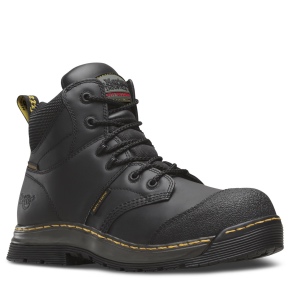
Survey finds that outdoor workers are neglecting their feet
In an industry where many workers are physically active for most, if not all of their day, the correct choice of footwear is essential, especially when faced with conditions such as freezing temperatures and damp environments. Yet many people neglect to take good care of one of their most important tools – their feet.
Here, Jon Marchant, Global Category Manager; Industrial Footwear at Airwair International – Dr. Martens – talks about the company’s recent survey, and how its findings point to a need for change.
Outdoor workers have their say
Our recent survey among outdoor workers, highlighted some concerning results when it comes to safety footwear worn on site.
The survey found that more than half (51%) of outdoor workers were unhappy with their boots, with 65% stating that they suffer with cold feet during the winter months, as well as many other complaints such as wet feet (40%), odours (25%), blisters (21%) and chilblains (16%). It is no surprise then, to hear that an overwhelming majority (73%) indicated that comfort is the key consideration when buying outdoor working footwear, followed by price and then safety features.
Know the risks: Make informed safety footwear choices
In an industry where potential hazards to workers’ feet are abundant, such as slips, trips and falls, heavy or sharp objects, and prolonged exposure to damp conditions that can cause bacterial infections, it is important for workers to think about what type of footwear they need to use to withstand such situations.
 If workers are focused purely on and price, they run the risk of overlooking features that are critical to safe outdoor working. Protective elements such as a safety toecap, water-resistance and a puncture resistant midsole, can all help to keep feet safe and healthy during the working day.
If workers are focused purely on and price, they run the risk of overlooking features that are critical to safe outdoor working. Protective elements such as a safety toecap, water-resistance and a puncture resistant midsole, can all help to keep feet safe and healthy during the working day.
Workers should prioritise choosing footwear that has been specifically designed to protect their feet from dangers while working, and a good start would be to look for boots that are compliant with set industry standards, such as the EN ISO 20345:2011 standard that specifies basic and additional requirements for safety footwear used for general purpose .
Whose job is it anyway?
The survey also found that the responsibility of purchasing safety footwear for work is currently being taken on by the individual in most cases and not by the employer, with three quarters of those surveyed stating that they purchase their own boots. Shockingly, 58% of outdoor workers purchase their boots from conventional high street stores or online retailers, instead of from specialist workwear manufacturers or trade counters that would be required to meet those tough industrial standards.
These figures highlight a potential cause for concern on sites across the country, especially in the light of the launch of tougher sentencing guidelines last February. Employers that are found to be responsible for incidents that involve injury to employees, could now face fines of more than £10 million for serious health and safety breeches, or even £20 million in corporate manslaughter cases. This highlights a real need to improve industry knowledge of the potential dangers from inadequate personal protective equipment (PPE), and what the best solutions are for the task being carried out.
Working together to improve awareness
As the survey results showed, most workers buy their own footwear, perhaps without the knowledge of what the best safety footwear solutions are, and the minimum features to look out for. This is where employers need to improve awareness of what is required on site.
Some employers are able to make contributions towards safety footwear purchases, and this would certainly go a long way to ensuring outdoor workers are purchasing the right boots in the first place. However, where this isn’t possible, improving industry knowledge is a good start to driving up standards across the industry, and will ensure that safety will be at the forefront of everyone’s minds.
Latest news

29th April 2025
Senior pledges to ‘bee’ part of the solution with new biodiversity initiative
Senior Architectural Systems has installed its first on-site beehive, marking another step forward in its commitment to sustainability and biodiversity.
Posted in Articles, Building Industry News, Building Products & Structures, Building Services, Curtain Walling, Doors, Glass, Glazing, Innovations & New Products, news, Restoration & Refurbishment, Retrofit & Renovation, Sustainability & Energy Efficiency, Walls, Windows
29th April 2025
West Fraser range delivering key benefits for South-East carpentry company
An experienced carpenter and building site manager who has recently set up his own company is using high performance panel products from the West Fraser range.
Posted in Articles, Building Industry News, Building Products & Structures, Building Systems, Case Studies, Garden, Restoration & Refurbishment, Retrofit & Renovation, Sustainability & Energy Efficiency, Timber Buildings and Timber Products
29th April 2025
CPD Courses Available Online From Ecological Building Systems
Ecological Building Systems, a leading supplier of natural building products for sustainable construction, has revealed its comprehensive CPD programme for the year ahead.
Posted in Articles, Building Industry Events, Building Industry News, Building Products & Structures, Building Services, Continuing Professional Development (CPD's), Information Technology, Innovations & New Products, Insulation, Restoration & Refurbishment, Retrofit & Renovation, Seminars, Sustainability & Energy Efficiency, Training, Walls, Waste Management & Recycling
29th April 2025
WindowBASE launches new prospect databases at FIT Show
Visit WindowBASE at the FIT Show to see first-hand how it helps companies find new customers – the company is launching an easy-to-use, intuitive platform on Stand G16 at the NEC Birmingham from 29th April – 1st May.
Posted in Articles, Building Industry Events, Building Industry News, Building Products & Structures, Building Services, Doors, Exhibitions and Conferences, Glass, Glazing, Information Technology, Innovations & New Products, Posts, Publications, Research & Materials Testing, Restoration & Refurbishment, Retrofit & Renovation, Windows
 Sign up:
Sign up: